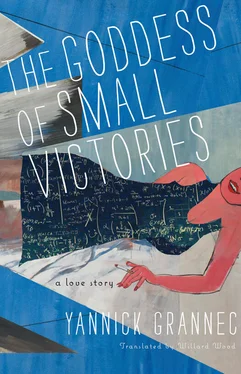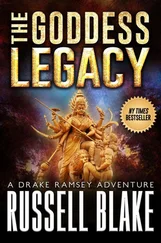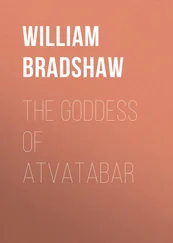I had been his lover, his confidante, his nurse, but in Grinzing I discovered the loneliness of living together. His manias did not stop at measuring a spoonful of sugar a hundred times. They governed every one of his actions. I had to recognize that he had not left his obsessions behind in the room at Purkersdorf. They were alive and kicking in our midst. His egotism was not a side effect of his ill health but intrinsic to his character. Had he ever thought of anyone but himself? I hid my condition. Ten years of patience had certainly earned me a small lie of omission.
I had begged my father to avoid talking about politics on my wedding day. At lunch, after a few glasses, he could restrain himself no longer. My fingers tightened on my napkin as he called for silence. After clinking his knife against his glass, he declared with wavering solemnity, “To the bride and groom, to our Czech friends, and to a lasting peace in Europe, finally!”
I watched Rudolf, our Czech “friend,” scowl and bite back a stinging retort.
Not long after the Anschluss, Hitler had declared his intention to “free the Sudeten Germans” from Czechoslovak “oppression.” The Nazis themselves had probably touched off the violent riots of the past few days. Rudolf was convinced that an invasion was imminent and that neither Daladier nor Chamberlain would raise a finger to stop it. The Munich Agreement, negotiated only a week after our wedding, would prove him right. Kurt, oblivious of this kind of tension, rose to offer a toast of his own: “To Adele, my beloved wife! To our honeymoon in the United States!”
I gave him my most radiant smile. As far as he was concerned, Princeton would soon send funds for a second ticket, despite the abruptness of our marriage. I thought it unlikely. I protected his unconcern, since all he wanted was peace.
I sipped my broth, stifling a wave of nausea. Whenever my mother, who had noticed my malaise, looked at me quizzically, I would pat my stomach distractedly. She didn’t catch on. Kurt must have ascribed my unaccustomed lack of appetite and silence to my emotions. He wouldn’t have noticed if Hitler had been dancing on the wedding table.
Having eaten our frugal meal, we left the Rathauskeller for a walk under a light rain. As we passed the little wooden stands where they sold grilled bratwurst, my father grumbled inopportunely, “If money was so tight, we could have had lunch on these benches or somewhere in Grinzing.”
My mother tugged on his arm to shut him up.
The façades of the buildings around the park, including parliament, carried banners with swastikas. Since March 12 when the Nazi troops entered the country, Austria had been called Ostmark, or East March, and Vienna had become German. The streets appeared strangely calm after the violence we had seen during the annexation.
My father refused to believe that Germany intended war, just as he’d refused to believe in the Anschluss. Yet our illusions had received a shock in the late winter of 1937. Although Chancellor Schuschnigg protested against the military maneuvers on our borders and the show of strength by the Austrian Nazis, he was forced under Hitler’s threats to accept the appointment of Seyss-Inquart as minister of the interior. Seyss-Inquart had tolerated, and perhaps secretly promoted, the pro-Nazi riots. The border towns, Linz, for example, were now thronged with uniformed men singing fervent Hitler songs. Austria’s youth, beset by economic problems and saturated with propaganda, jumped eagerly at the prospect of annexation with Germany. In early March, Schuschnigg called for a referendum on Austria’s independence — a pathetic effort to preserve our country’s freedom. Hitler responded by ordering Schuschnigg to cancel the referendum or he would send German troops into Austria. On the evening of March 11, we listened to our chancellor announce his resignation over the radio. A hysterically happy mob then invaded the streets, breaking shop windows and harassing shopkeepers. Lying low in Grinzing, I prayed all night for my parents’ shop to be spared. But the crowd’s destructive anger was far from blind; it targeted only Jewish-owned stores. By dawn, German boots were crossing the border. The chaos was an ideal pretext: order had to be restored. The Austrians were no longer able to regulate themselves. Neither France nor Britain tried to interpose. The Germans penetrated Austria to cheers and flowers. We almost begged them to come and save us from ourselves. Invaders have never been more warmly greeted. And why shouldn’t they have been? They brought hope of stability and prosperity to a country on the brink of civil war and in a deep and lasting depression. It hardly mattered that the unrest had been fostered by the Nazis or that the economic recovery was the first step in a horrifying grand design. They offered an easy solution: “Death to the Jews.”
No one beyond a few misty-eyed dreamers like my father could still be misled by the Nazis’ posturing. Hitler would not stop at Austria or the Sudetenland. War was about to break out in Europe. On March 12, 1938, the Austrians welcomed the Germans as if they were distant relatives coming back into the fold. They might be a bit frightening, but they carried armloads of gifts. The Germans organized handouts of food to the neediest and promised to extend the social security network to all Austrians. They also promised payments to the unemployed and vacations to schoolchildren. The war over, we woke up with a major hangover and buried our shame under geraniums and furniture polish. When a new referendum was ordered by the Nazis, workers and bourgeois alike jumped at the chance to sit in their German uncle’s lap. He might have rapacious jaws and wandering hands, but his wallet was well stuffed.
Marianne Gödel had warned us in vain. The more clear-sighted among Kurt’s Jewish friends were already gone. I was blind and married to a man who was deaf. Giving in to my own panic would have dragged Kurt down into a deep and crippling anxiety. My job was to smooth things over. A minority was still sounding the alarm, but I belonged to the silent majority. How do you go against the current of history when your comfort and your hopes for personal fulfillment are not in any way altered by that current?
I can’t lie: I saw the broken shop windows, the families kneeling in the gutter, the abuse of the elderly, the street arrests. Like all the others, I reacted as though bobbing in a whirlpool where, to keep from drowning, you think of yourself first.
I’d asked Anna if I was making a mistake in not accompanying my future husband to America.
She simply shrugged. “I can’t tell the future, sweet cakes. What does your guy say about it?”
“Everyone is moving there. You should think about it yourself, Anna.”
“With what money? And how am I going to feed my son over there? I’m not going to start streetwalking in New York just to get away from these German hicks! Anyway, America is only for the rich.”
“Your Dr. Freud has left the country.”
“Then there will be plenty of work for us here.”
“My mother-in-law says the Nazis are going to eliminate the Jews.”
“So you have nothing to worry about. You aren’t Jewish. And I’ll be fine. They won’t come looking for me in Purk! Anyway, Wagner-Jauregg has always kept an eye out for me. And my kid is staying with good people. They would never rat him out.”
On April 10, the referendum ballots were inscribed with two circles: a big one for Yes and a tiny one for No. As if that weren’t enough, Nazi officials inspected every ballot as the voters emerged from the polling booth, passing the paper from hand to hand. The Reich had guaranteed itself an overwhelming majority in a rigged election. A staggering 99.75 percent of Austrians voted Yes. I did the same, then went and barricaded myself in our apartment in Grinzing. That evening, the news of the outcome would set off extraordinary violence in the streets. Kurt worked in the silence of his study. I touched his shoulder lightly. He emerged from his dream to say, “Adele, did you find any coffee? Yesterday’s was just terrible.”
Читать дальше












